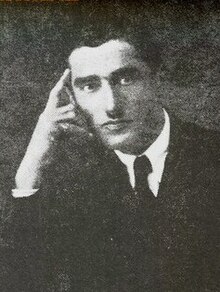Our website is made possible by displaying online advertisements to our visitors.
Please consider supporting us by disabling your ad blocker.
Nuri Dersimi

Mehmed Nuri Dersimi (1893 – 22 August 1973), also known as Baytar Nuri, was a Kurdish writer, revolutionary and intellectual.[1]
Dersimi was born in March 1893 in the village Akpınar near Hozat, in the Sanjak Dersim.[1] From 1899 he went to primary school in Hozat. After, he was sent to the military academy in Elazığ, but he was not happy there and asked to come back to his family. His father decided to move with his family to Harput in 1905, where Dersimi attended secondary school. There Dersimi was more comfortable. In 1907 the family moved again to Hozat, where Dersimi could stay with his uncle and visit the local boarding school.[2] 1911 he traveled Istanbul by ship via Trabzon and began to study veterinary medicine. There he became a member of the Kurdish student society Hevi-Kürt Talebe Cemiyeti and 1912 he became the secretary of the Kürdistan Muhibban Cemiyeti.
During World War I, he worked as a military veterinarian in Erzincan.[3][4] In Erzincan he was a witness of the massacres perpetrated against the Armenians. Because of his political activities, in 1916 he was sent to Kangal, in Sivas, where he married his wife Selvi. In 1917 he returned to Istanbul to finish his studies.
From 1919 to 1921 the Koçgiri rebellion took place, which Dersimi supported. He opposed the findings of Abdulkadir Ubeydullah and preferred independence to autonomy for the Kurds. In October 1920, he departed from Istanbul and travelled to the region of the Koçgiri tribe in the Erzincan Province, where he established several offices for the Society for the Rise of Kurdistan.[5] But already in 1919, Mustafa Kemal Atatürk became aware of Dersimi's activities and offered him and Alisan, another prominent member of the Koçgiri tribe to be a candidate for the Grand National Assembly of Turkey, an offer they both refused to accept.[6] After the suppression of the Koçgiri rebellion, Mustafa Kemal accused Dersimi of being responsible for the uprising and excluded him from an amnesty for the rebels.[6] After this, Dersimi hid with Seyid Riza and taught people to write Kurdish in Latin letters and was a well-perceived notable amongst the Kurdish community.[7] In 1931 the Turkish government pardoned Dersimi and gave him a farm in Holvenk.[7] But the Turkish authorities still kept searching his house. Friends visited seldom, and Dersimi's situation became more difficult. Following a visit to Ankara, he demanded to be provided with a new home in the west of the country, a request which was denied. After he was summoned by the military commander Abdullah Aldoğan of the Fourth Inspectorate-General in the Dersim region, he became aware that he could not stay in Turkey any longer.[8]
In summer 1937 he decided to flee first to Greece, after to Syria which at the time was under French Mandate. On the 11 September 1937 he crossed into Syria.[9]
He had adopted several children in Syria, one of whom he named after Seyid Riza. His son Seyid Riza had a son as well who was named after his grandfather, Nuri Dersimi.[10]
- ^ a b Kieser, Hans-Lukas (1997). "Mehmet Nuri Dersimi, ein asylsuchender Kurde". In Kieser, Hans-Lukas (ed.). Kurdistan und Europa:Einblicke in die kurdische Geschichte des 19. und 20. Jahrhunderts (in German). Zürich: Chronos. p. 4. ISBN 978-3-905312-32-4.
- ^ Kieser, "Mehmet Nuri Dersimi".
- ^ Kieser, "Mehmet Nuri Dersimi".
- ^ "Nuri Dersimi (Dersim, 1893- Alep 1973) | Sciences Po Violence de masse et Résistance - Réseau de recherche". www.sciencespo.fr (in French). Retrieved 2019-09-21.
- ^ Olson, Robert (1989). The Emergence of Kurdish Nationalism and the Sheikh Said Rebellion, 1880–1925. University of Texas Press. p. 28. ISBN 0292776195.
- ^ a b "The Repression of the Koçgiri Rebellion, 1920-1921 | Sciences Po Violence de masse et Résistance - Réseau de recherche". repression-koa-giri-rebellion-1920-1921.html (in French). 2019-04-15. Retrieved 2020-12-15.
- ^ a b Kieser, "Mehmet Nuri Dersimi", p. 202
- ^ Kieser, "Mehmet Nuri Dersimi", p. 203
- ^ Kieser, "Mehmet Nuri Dersimi".
- ^ "The Rojava Legacy of Nuri Dêrsimî". ANF News. Retrieved 2019-09-21.
Previous Page Next Page


